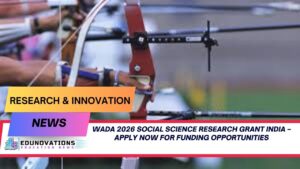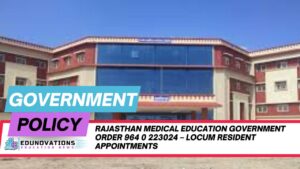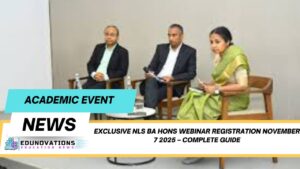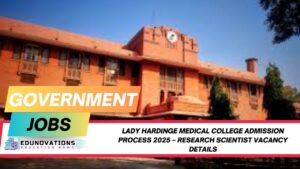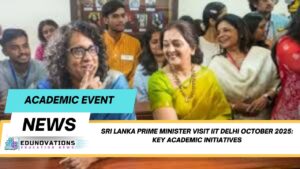Explore the CMC Vellore Cell and Gene Therapy Symposium 2025 highlights, innovations in stem cell research, and gene therapy advancements in India.
Christian Medical College (CMC) Vellore recently hosted its 10th Annual CMC Vellore Cell and Gene Therapy Symposium 2025 highlights, underscoring India’s expanding landscape in advanced medical research. Held on October 10 and 11, the symposium brought together leading researchers, clinicians, and scientists from India and abroad, emphasizing translational science, cutting-edge therapies, and collaborative innovation.
Advancing Gene and Cell Therapy in India
The symposium was virtually inaugurated by the Honourable Union Minister for Science and Technology, Dr. Jitendra Singh, alongside Dr. Rajesh S. Gokhale, Secretary of the Department of Biotechnology, and CMC Vellore Director Dr. Vikram Mathews. The event highlighted India’s pioneering work in developing first-in-human gene therapies for genetic disorders such as Haemophilia.
Dr. Gokhale emphasized the role of the BioE3 policy in shaping bioeconomic growth, while Dr. Mathews highlighted achievements at the Centre for Stem Cell Research (CSCR), including the use of Mesenchymal Stem Cells (MSCs) for regenerative medicine. Over 50 expert faculty members participated, covering gene therapy, diagnostics, and cell-based therapies.
Keynote Lectures and Innovations
The symposium featured high-impact lectures, including Dr. Mitchell Weiss from St. Jude Hospital, USA, discussing lentiviral genome editing for β-thalassemia and sickle cell anaemia. Dr. Poonam Malik from Cincinnati Children’s Hospital presented clinical studies with modified gamma-globin vectors for beta-hemoglobinopathies, focusing on scalability, cost-effectiveness, and therapeutic benefits.
Sessions on organoid research featured Dr. Ruchi Tandon (THSTI, New Delhi), Dr. Arvind Ramanathan (BRIC-InStem, Bengaluru), and Dr. Indumathi Mariappan (LVPEI, Hyderabad), emphasizing organoid applications in drug testing. The event also explored affordable CAR-T cell therapies, insulin-secreting β-cell transplantation, and cellular energy “rewiring” for tissue repair and genetic disorder treatment.
Collaborative Research and Capacity Building
Experts discussed GMP compliance, scalable production, and regulatory frameworks for gene and cell therapies. Delegates highlighted the importance of translational science, collaborations, and biotechnology infrastructure in delivering affordable, scalable, and equitable therapies in India.
Training initiatives and the integration of whole-genome sequencing into clinical contexts promise precision medicine advancements, enabling early diagnosis and population-level benefits for inherited and complex disorders. These innovations reflect India’s dual responsibility to lead in medical breakthroughs while addressing domestic healthcare needs.
Engaging the Next Generation of Scientists
A quiz competition for medical and science students, along with poster and travel awards, encouraged active participation. Dr. Srujan Kumar lauded global speakers and students for fostering scientific enthusiasm and advancing cell and gene therapy research in India.
World Hospice and Palliative Care Day 2025 Observed at CMC Vellore
On October 11, CMC Vellore’s Department of Palliative Medicine marked World Hospice and Palliative Care Day 2025 CMC Vellore events, focusing on “Achieving the Promise: Universal Access to Palliative Care.” Activities included cartooning, video-making, and debates, fostering awareness of palliative care access in India.
Mrs. Alice Sony, Nursing Superintendent, emphasized the need for equitable palliative care, while tree-planting drives and a walkathon promoted sustainability and advocacy. At the Ida B. Scudder Hospice, patients performed music, and families shared experiences, highlighting compassionate care.
Competitions and Recognition
- Debate Winners: Dr. Rishanthini D (Radiation Oncology), Mr. Dinesh T (Staff Nurse)
- Cartooning First Prize: Mr. Dinesh T
- Video-Making First Prize: K Ward Nursing Team
These initiatives strengthen public engagement and reflect CMC Vellore’s commitment to education, advocacy, and service.
Enhancing Research Through Workshops
The Technical Resource Hub, CMC Vellore, under the Ministry of Health and Family Welfare, conducted a three-day workshop on systematic reviews, meta-analysis, and the Evidence to Decision framework. This training enhances research quality and ensures robust evidence-based healthcare recommendations.
Expert Insights
Medical experts underline that India’s future in cell and gene therapy lies in collaborative research, affordable therapy development, and public engagement. Integrating genomic tools and regulatory frameworks ensures innovations are safe, effective, and scalable for widespread healthcare impact.
Internal and External Resources for Learners
- For NCERT Courses: NCERT Courses
- For Current Affairs: Current Affairs
- For Notes: Notes
- For MCQs: MCQs
- For Videos: Videos
- For Syllabus: Syllabus
- For NCERT PDF Downloads and Mind Maps: Free PDFs
- External Resource for Schools Contact: Mart India Infotech
Toppers Use Mind Maps to score more than 95%
NCERT Class 11th Commerce Mind Maps
Add to cartOriginal price was: ₹999.00.₹199.00Current price is: ₹199.00.NCERT Class 12th Chemistry Mind Maps
Add to cartOriginal price was: ₹199.00.₹75.00Current price is: ₹75.00.NCERT Class 12th Commerce Mind Maps
Add to cartOriginal price was: ₹999.00.₹199.00Current price is: ₹199.00.NCERT Class 12th Science Mind Maps
Add to cartOriginal price was: ₹999.00.₹199.00Current price is: ₹199.00.NCERT Mind Maps For Class 10th
Add to cartOriginal price was: ₹999.00.₹199.00Current price is: ₹199.00.
Purchase Today
FAQs
- What were the main topics at the CMC Vellore Cell and Gene Therapy Symposium 2025 highlights?
The symposium focused on gene therapy, stem cell research, organoid applications, CAR-T cell therapies, and translational research. - Who inaugurated the Cell and Gene Therapy Symposium at CMC Vellore?
The event was inaugurated by Dr. Jitendra Singh, Union Minister for Science and Technology. - What are the key outcomes of World Hospice and Palliative Care Day 2025 CMC Vellore events?
Awareness campaigns, music performances, debates, and creative competitions emphasized universal access to palliative care. - Which international experts attended the CMC Vellore symposium?
Experts from St. Jude Hospital, Cincinnati Children’s Hospital, University of Pennsylvania, and Swansea University contributed lectures and workshops. - How is CMC Vellore enhancing translational research in India?
Through GMP-compliant practices, collaborative initiatives, advanced genomic tools, and capacity-building workshops. - What competitions were conducted for students during the symposium?
Quiz competitions, poster presentations, and travel awards were given to recognize excellence in research participation. - What initiatives promote palliative care awareness in India?
Tree-planting drives, walkathons, debates, and video-making competitions organized by CMC Vellore’s Department of Palliative Medicine. - Which stem cell therapies were discussed during the symposium?
Mesenchymal stem cell therapies, CAR-T cell development, and β-cell transplantation for diabetes were discussed. - How can students access NCERT resources linked to these events?
Students can access NCERT Courses and Free PDFs for study materials. - Why is India’s role significant in cell and gene therapy development?
India provides scalable, cost-effective, and equitable innovations addressing both domestic healthcare and global research needs.







